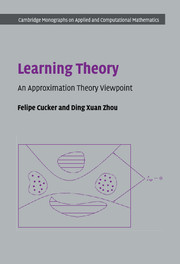Book contents
- Frontmatter
- Contents
- Foreword
- Preface
- 1 The framework of learning
- 2 Basic hypothesis spaces
- 3 Estimating the sample error
- 4 Polynomial decay of the approximation error
- 5 Estimating covering numbers
- 6 Logarithmic decay of the approximation error
- 7 On the bias–variance problem
- 8 Least squares regularization
- 9 Support vector machines for classification 157
- 10 General regularized classifiers
- References
- Index
Preface
Published online by Cambridge University Press: 05 March 2010
- Frontmatter
- Contents
- Foreword
- Preface
- 1 The framework of learning
- 2 Basic hypothesis spaces
- 3 Estimating the sample error
- 4 Polynomial decay of the approximation error
- 5 Estimating covering numbers
- 6 Logarithmic decay of the approximation error
- 7 On the bias–variance problem
- 8 Least squares regularization
- 9 Support vector machines for classification 157
- 10 General regularized classifiers
- References
- Index
Summary
Broadly speaking, the goal of (mainstream) learning theory is to approximate a function (or some function features) from data samples, perhaps perturbed by noise. To attain this goal, learning theory draws on a variety of diverse subjects. It relies on statistics whose purpose is precisely to infer information from random samples. It also relies on approximation theory, since our estimate of the function must belong to a prespecified class, and therefore the ability of this class to approximate the function accurately is of the essence. And algorithmic considerations are critical because our estimate of the function is the outcome of algorithmic procedures, and the efficiency of these procedures is crucial in practice. Ideas from all these areas have blended together to form a subject whose many successful applications have triggered its rapid growth during the past two decades.
This book aims to give a general overview of the theoretical foundations of learning theory. It is not the first to do so.Yet we wish to emphasize a viewpoint that has drawn little attention in other expositions, namely, that of approximation theory. This emphasis fulfills two purposes. First, we believe it provides a balanced view of the subject. Second, we expect to attract mathematicians working on related fields who find the problems raised in learning theory close to their interests.
While writing this book, we faced a dilemma common to the writing of any book in mathematics: to strike a balance between clarity and conciseness. In particular, we faced the problem of finding a suitable degree of self-containment for a book relying on a variety of subjects.
- Type
- Chapter
- Information
- Learning TheoryAn Approximation Theory Viewpoint, pp. xi - xiiPublisher: Cambridge University PressPrint publication year: 2007

